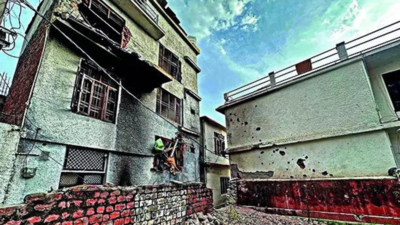POONCH: Shells screamed through the early morning darkness of May 7, tearing through homes and lives in Poonch district, close to the LoC in J&K. At Sukha Kattha, a cluster of small homes on a mountainside, Javid Iqbal’s five-year-old daughter Mariyam lay in his lap, her stomach ripped open by shrapnel. “She died in my arms,” he said on May 30, showing her photo, voice choked. His eight-year-old daughter Iram Naaz was wounded too.In another part of the district, at Jamia Zia-ul-Uloom, a 52-year-old seminary that doubles as a boarding school, Qari Mohammad Iqbal had just started his day. A shell exploded near an under-construction building beside his room, sending metal splinters flying. Four students were wounded. Qari Iqbal, a 46-year-old Quran teacher, was declared dead on arrival at the district hospital.As bombs rained on Poonch for three days, 14 civilians lost their lives, including students, religious teachers, shopkeepers, homemakers, and former soldiers. Over 65 were wounded — many with life-altering scars.Panic spread faster than the blasts. Families fled, streets emptied, The district fell silent under fear. “Not even in 1965 did we witness this kind of bombardment,” said Zulfikhar Ali, a shopkeeper in Poonch town’s main market. “Everyone who could afford to leave, left.”From May 6 night to May 10, five shells landed outside BJP functionary Pradeep Sharma’s home. “It began at 1.45 am and didn’t stop for days,” Sharma said. “Doctors worked tirelessly, but if we had ventilators, we might have saved six to eight more. We need a trauma hospital here, a govt medical college.”Sharma said 80% of Poonch fled by May 10. He demanded bunkers for every household and government jobs, not just for families of the dead but also for those wounded in the shelling. “Thirty-five of them have lifelong wounds,” he said. “They’re living with trauma too.”Amid loss and grief, another wound cut deep — one of defamation. Hours after Qari Iqbal’s death, Delhi-based news channels flashed his photo on screen, calling him a Lashkar-e-Taiba terrorist killed in Operation Sindoor.At Jamia Zia-ul-Uloom on May 30, his brother Farooq Ahmad sat quietly, his face sunken. “We were already mourning, and then we got WhatsApp forwards. Friends asked, ‘Why are news channels calling your brother a terrorist?’ He had a beard and a Muslim name. That was enough for them to brand him something he wasn’t. Even in death, he was humiliated.”Authorities moved quickly. Poonch police and district officials called the reports “baseless and misleading”. Legal action was threatened against any outlet or person spreading false claims. Both CM Omar Abdullah and Congress MP Rahul Gandhi visited the Jamia and were briefed about the slander.Nazira Kousar, a mother from Poonch, rushed through falling shells to the hospital on May 7. Her 14-year-old son had been wounded at the seminary. “Nothing could stop me,” she said. “He survived, but now hides under a blanket, afraid to go outside. My husband has liver disease. We can’t afford treatment.” She came back on May 30, hoping someone would listen.On May 31, Union home minister Amit Shah handed job appointment letters to the next of kin. Dalbir Singh, who lost his brother Ranjit Singh, a grocery shop owner, received one. “He never married. He was calm and lovable,” Dalbir said. “I feel the sky has fallen on us. I just want this to end.”At least five members of the local Sikh community died, including former Army officer Amarjeet Singh, homemaker Ruby Kaur, and neighbour Amreek Singh. A gurdwara wall was damaged in the shelling. As Poonch recovers from three days of unrelenting fire, scars remain — carved in stone and memory.











